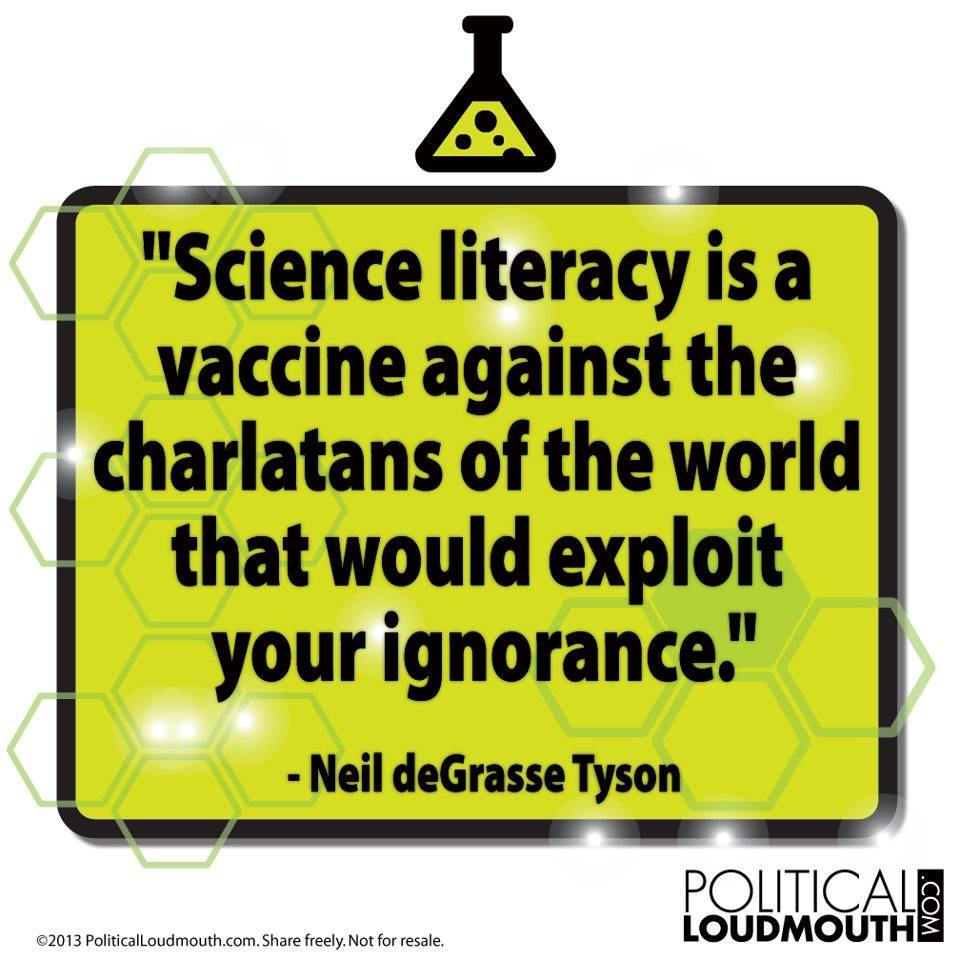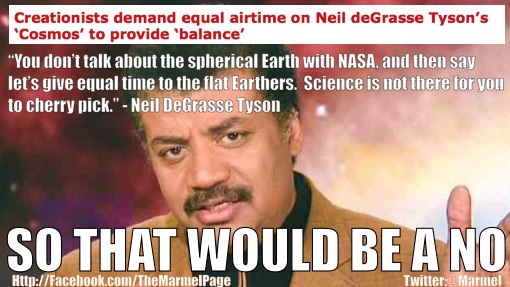Follow the evidence wherever it leads, and question everything.
- Neil deGrasse Tyson
 I’ll admit to being surprised by the furious Evangelical (albeit a vocal minority) reaction to “Cosmos.” The backlash, stunning in both its ferocity and intellectual vacancy, would seem to indicate that some born-again Christians feel quite threatened by detailed discussions of science, particular when it comes to comparing and contrasting evolution and creationism. In the eyes of some, a discussion of science is ipso facto an attack on Christian faith.
I’ll admit to being surprised by the furious Evangelical (albeit a vocal minority) reaction to “Cosmos.” The backlash, stunning in both its ferocity and intellectual vacancy, would seem to indicate that some born-again Christians feel quite threatened by detailed discussions of science, particular when it comes to comparing and contrasting evolution and creationism. In the eyes of some, a discussion of science is ipso facto an attack on Christian faith.
BLASPHEMY!!
Wanting to get a better understanding of the controversy, and since I hadn’t seen the first two episodes of “Cosmos,”, I decided to find out what the fuss was about. After watching both episodes, I find myself even more confused about why Evangelical have their panties in a wad. The assumption on their part seems to be that science is the enemy of faith, and that seeking truth through the scientific method is indicative of a heretic or one who’s faith is lacking. If your faith was strong enough, or so the argument appears to go, you’d understand that science is just another theory- a secular humanist plot designed to secularize the world and disrespect God.
Except that’s not at all what “Cosmos” is about. I was (and remain) fascinated by the series and Neil deGrasse Tyson’s (the sexiest astrophysicist alive?) ability to make very detailed and complicated science very accessible. And “Cosmos” IS about science- the observable, the demonstrable, the empirical- things that are known because they’ve been demonstrated to be true. Science is a collaborative effort among humankind to develop a better and more complete understanding of our world. Viewing that as anti-Christian is simply irrational and nonsensical.
Although it receives less airtime than fundamentalist theological strains, scientifically-informed theology is norm — not the exception — among modern American Christians. For every conservative pundit or elected official who tries to use the Bible to deny climate change, polls show that there are millions more religious Americans (read: the majority of almost every faith major faith tradition) who agree that the recent string of natural disasters were the result of climate change. In fact, a recent study conducted by Rice University found that not only do roughly half of American evangelicals believe that “science and religion can work together and support one another,” but that evangelical scientists actually practice their religion more than evangelical Protestants in the general population.
 The idea that religious faith and science are mutually exclusive, which seems to be the operating philosophy of Evangelicals objecting to “Cosmos,” is prima facie false. In fact, in many ways they dovetail rather well. Neither science nor religion are in sole possession of the answers to questions about who we are and how we got here. Many great scientists have been men and women of surpassing religious faith. It’s not at all incongruous to believe in the pursuit of scientific truth while also believing in a benevolent and omniscient God. Yet so many Evangelicals world view can be summed up thusly:
The idea that religious faith and science are mutually exclusive, which seems to be the operating philosophy of Evangelicals objecting to “Cosmos,” is prima facie false. In fact, in many ways they dovetail rather well. Neither science nor religion are in sole possession of the answers to questions about who we are and how we got here. Many great scientists have been men and women of surpassing religious faith. It’s not at all incongruous to believe in the pursuit of scientific truth while also believing in a benevolent and omniscient God. Yet so many Evangelicals world view can be summed up thusly:
“God said it. I believe it. That settles it.”
It’s at this point one should be reminded that assuming the Bible to be the sacrosanct and inviolable Word of God is the very least a stretch of the imagination. The Bible was transcribed by many hand over an extended period of time, which almost certainly means much was lost in the translations. What we have is at best a reasonable approximation of the Word of God. To believe that Scripture was anointed by God and is without question a literal transcription of His words and thoughts defies objective reality. But, alas, that’s another discussion best left for another time.
Science is not in competition with faith. The job of a scientist is not to disprove the existence and primacy of God. It’s to document the observable and the provable. It’s to increase our understanding by determining what IS and how it came to be. Instead of viewing faith to be inimical to science, to be in direct competition with the scientific method, why not view science as God’s gift to mankind? Wouldn’t it stand to reason that science is a gift from God allowing us to investigate and learn about our world? If you believe that an omniscient God gave us all things, wouldn’t it sensible to extend that belief to science?
I don’t believe in God, but if there was a Supreme Being looking down upon us, would he/she look kindly upon denying part of their creation simply because it doesn’t fit with someone’s dogma or preconceived notions? Or are really on the path to proving the circularity of history being reconstituting the Inquisition, where freedom of thought and an inquisitive mind are viewed as a threat to the collective dogma?
You may not believe in science or the scientific pursuit of truth, but that neither negates nor invalidates that pursuit. Ignorance is a lifestyle choice common among those who fear what they refuse to understand. In a free country, a person is free to choose what, whom, and/or how to believe. I choose to believe in the power of science and the pursuit of truth and understanding. If you find that to be a clear and present danger to your religious faith, I’d submit the problems lies with the strength of your faith.

